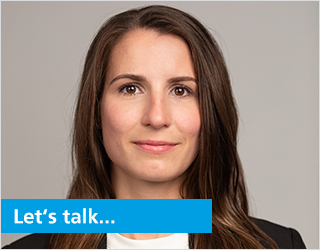
In our interview series in each newsletter, we introduce you to a member of the Fraunhofer Business Area Cleaning in more detail. This time Ann-Katrin Großmann from the Fraunhofer Institute for Manufacturing Engineering and Automation IPA answered our questions. Read more about her career and her personal perspective on the goals, potential and wishes for the Fraunhofer-Business Area Cleaning.
- How did you join Fraunhofer-Business Area Cleaning?
I have been working at Fraunhofer IPA since 2017 as a research assistant in the field of purity technology, where my main focus is on technical cleanliness, i.e. testing component cleanliness, among other things. Thus, I do not directly enter the business area through the field of cleaning, but via the detour of cleaning validation and verification of the cleaning effect. In my very first year, I was able to give a lecture on cleanliness testing and the basics of standards in this area at the basic seminar in Dresden, and I have been a permanent part of the business area ever since.
- What goal have you set yourself for your work at Fraunhofer-Business Area Cleaning?
As I am primarily active in the field of training, I would like to enter into an exchange with the training participants from industry and here receive new impulses from the current issues in industry and - if possible - implement them. My goal is that the participants understand which very different possibilities there are for cleanliness testing, at what point which method is useful, and what conclusions can be drawn from the results.
- What would you like to pass on to the customers Fraunhofer-Business Area Cleaning?
It is important to me that the customers of Fraunhofer-Business Area Cleaning understand that when it comes to cleanliness and cleanliness, the intent should always be to act as clean as necessary and not as possible. It is essential that the consequences of cleanliness limits and purity requirements are taken into account when setting them, as these often involve a great deal of cleaning and testing.
- What does the Fraunhofer IPA offer in cleaning technology?
Our service portfolio in the field of cleaning technology is broadly diversified. We evaluate and optimize cleaning processes, develop individual cleaning processes, devices and tools, take on cleaning orders for various large individual parts, small series, devices and systems, as well as the subsequent packaging of the high-purity cleaning goods. We provide support both in the selection of a cleaning process and in the creation and optimization of a suitable process for the customer-specific application. For this purpose, we can rely on the most common processes in laboratories at Fraunhofer IPA and use comprehensive analytics to investigate the effectiveness of the selected processes for the application at hand.
- What makes you a competent partner in cleaning technology?
My department has been working independently in the fields of cleanliness technology and contamination control for more than 35 years, across all industries - from microelectronics and life science applications to the automotive and aerospace industries - and has more than 25 years of experience in the field of technical cleanliness. I can therefore draw on a very comprehensive wealth of experience if I do not know the answer to a question. In addition, I have access to the most modern and up-to-date infrastructure for working on technical cleanliness issues, from the available cleanroom laboratories to the measuring equipment.
- What do you wish for the industry?
I would like to see the cleanability of components taken into consideration at an earlier stage in other technological disciplines, such as development and planning, so that cleaning technology does not end up having to compensate for errors that can then only be solved at great expense or inadequately.
- What is urgently needed so that the next big step can be taken in the field of cleaning technology?
One problem in the field of cleaning technology in recent years has been that substances have been banned across the board. For example, solvent cleaning was often replaced by aqueous cleaning. In the future, there should be a better awareness of the fact that the use of substitute substances can also lead to problems. In my opinion, a more differentiated consideration of risks and benefits would be very helpful here.
 Fraunhofer-Business Area Cleaning
Fraunhofer-Business Area Cleaning